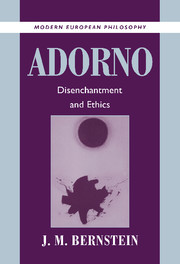Book contents
- Frontmatter
- Contents
- Preface
- List of Abbreviations
- Introduction
- 1 “Wrong Life Cannot Be Lived Rightly”
- 2 Disenchantment: The Skepticism of Enlightened Reason
- 3 The Instrumentality of Moral Reason
- 4 Mastered by Nature: Abstraction, Independence, and the Simple Concept
- 5 Interlude: Three Versions of Modernity
- 6 Disenchanting Identity: The Complex Concept
- 7 Toward an Ethic of Nonidentity
- 8 “After Auschwitz”
- 9 Ethical Modernism
- Index
Introduction
Published online by Cambridge University Press: 05 June 2012
- Frontmatter
- Contents
- Preface
- List of Abbreviations
- Introduction
- 1 “Wrong Life Cannot Be Lived Rightly”
- 2 Disenchantment: The Skepticism of Enlightened Reason
- 3 The Instrumentality of Moral Reason
- 4 Mastered by Nature: Abstraction, Independence, and the Simple Concept
- 5 Interlude: Three Versions of Modernity
- 6 Disenchanting Identity: The Complex Concept
- 7 Toward an Ethic of Nonidentity
- 8 “After Auschwitz”
- 9 Ethical Modernism
- Index
Summary
Nature, in ceasing to be divine, ceases to be human. Here, indeed, is just our problem. We must bridge the gap of poetry from science. We must heal this unnatural wound. We must in the cold reflective way of critical system, justify and organize the truth which poetry, with it quick naive contacts, has already felt and reported.
John DeweyNo reading of the works of T. W. Adorno can fail to be struck by the ethical intensity of his writing, sentence by sentence, word byword. Whether he was writing about questions in epistemology, aesthetics, social theory literature, or music, one senses that these were vehicles for his sombre ethical vision of a world grown inhuman in which the primary task of the intellectual had become critical vigilance; all accommodation was exacerbation of the worst: “It is the sufferings of men that should be shared: the smallest step towards their pleasures is one towards the hardening of their pains” (MM, A5). However, if even in the worst world, there are joy, love, acts of courage, and decency, then in relentlessly focussing on what distorts and corrupts what is of worth Adorno is adopting a partial and limited perspective. While this partiality is the evident risk of Adorno's philosophising, it is a risk he thought ethically compelled to make without believing it could be unconditionally justified: “We shudder at the brutalization of life, but lacking any objectively binding morality we are forced at every step into actions and words, into calculations that are by humane standards barbaric, and even by the dubious values of good society, tactless” (MM, A6).
- Type
- Chapter
- Information
- AdornoDisenchantment and Ethics, pp. 1 - 39Publisher: Cambridge University PressPrint publication year: 2001

